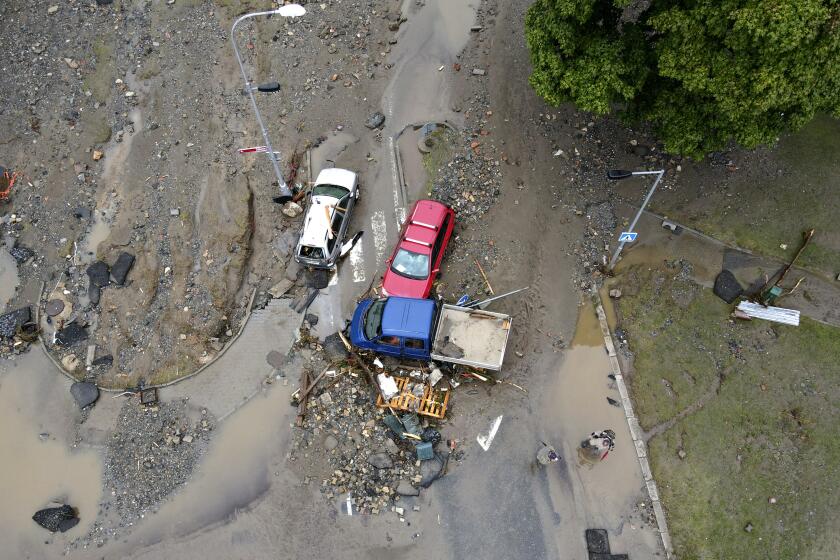Tribal Chief Wields Pen, Not Sword, in Fight Against Insurgents
Sheik Ammar Obeidi is a marked man, threatened with death for siding with the Americans in the bloody fight for Iraq’s future.
He knew it from the get-go, and he accepted it as the price of his beliefs. After all, he noted, there also was a time in the early days of the United States when patriots risked their lives.
Grateful for his allegiance, Americans in turn have grubstaked Obeidi in a campaign to try to sway fence-sitters among his countrymen. The result is one of those can-you-believe-this occurrences: a Marine Corps-financed, Iraqi-published newspaper now in circulation from Baghdad west through cities and towns such as Ramadi, Hit and Baghdadi.
“Few people here know the meaning of freedom,” the sheik said over a lunch of kebabs and barbecued chicken. “This simple word that every American child knows the meaning of -- here, it is misused to mean the freedom to steal or the freedom to kill. The purpose of this newspaper is to teach people the true meaning of the word, to teach them this simple thing.”
Obeidi’s Arabic-language newspaper is called Al Furat, or the Euphrates. Volume No. 5 of the weekly publication was distributed Thursday -- a graphically splashy paper with an array of features that any Westerner would find familiar: local news, editorials, a women’s page, sports, arts and entertainment. It is produced by a staff of six, including four reporters. Freelance articles are encouraged.
About half of the eight-page issue was taken up by a profile of a local painter, an article on soda pop and tooth decay, an article on the use of green onions, a news account of water and electricity shortages in thetown of Furat and a fitness piece illustrated with a picture of Arnold Schwarzenegger.
The remainder of the issue provided a mix of “message” journalism. Obeidi wrote a signed, front-page editorial addressed to the young people of Iraq, who had spent most of their lives under a dictatorship. “They don’t know there is anything else. They think all presidents are like” Saddam Hussein, Obeidi said.
His editorial reminds them that Iraq was once a country where women wore miniskirts to work and where people believed in the right of independent thought.
Another article explored the Islamic meaning of jihad. “When one works and feeds his family, that is jihad,” Obeidi said. “When one does a good project to help others, that’s jihad. The highest level of jihad is when one prevents himself from doing bad. Jihad is not really this thing that other people say.”
Which is not to say that the Euphrates paper reflects standard American cultural values. This same issue carried an article decrying the “disease or virus” of women going unmarried. “A woman must get a husband or no one will take care of her when she gets old,” the article concluded.
Another article was sharply critical of the U.S. for not delivering on promises to bring clean water to a village.
Still, the reach of this 5,000-circulation newspaper already has been demonstrated. Several weeks ago, the front page featured what a U.S. reader might regard as a photograph of civic leaders at a groundbreaking for a new Iraqi civil defense station.
In troubled Iraq in the year 2004, the photo was far from commonplace.
“They came to me and said how could I do this, put their pictures in the paper?” recalled Lt. Col. Phil Skuta, commander of the 2nd Battalion, 7th Marine Regiment, which operates in this region of Iraq.
At a time when insurgents target American sympathizers at every chance, these citizens were distraught to have their photograph in a newspaper that was created with a $10,000 grant from Skuta and his Marines.
Skuta recalled telling the Iraqis, “Look, I didn’t publish your picture. An Iraqi journalist did. In an Iraqi newspaper. Welcome to democracy.”
Although it doesn’t entirely square with the warrior image, Marines and other American troops have made a priority of trying to foster friendly media in Iraqi.
Providing financing and equipment for regional and municipal television stations has been a particular priority. So when Obeidi, a 48-year-old civil engineer, approached the Marines three months ago with his plan for a newspaper, Skuta replied, “Absolutely.”
“We have to plant the seeds of a pluralistic society,” the Marine commander said.
The sheik has no misgivings about America’s motives for invading his country.
“This is a very important moment in Iraq’s long history. In 1,000 years, the Iraqi people will still remember this time. The United States gave the blood of their best youth for the freedom of the Iraqi people. And we need the help of the people of the United States now so we can learn to stand on our own. We are only at the beginning of a new road.”
Obeidi was born on the island of Juba in the Euphrates, 100 miles west of Baghdad. He carries the inherited title of “sheik” as a leader in his community, the Obeidi tribe.
In his short career as a publisher, he has been menaced many times but remains undeterred.
“Someone had to do it,” he said. “Maybe I’ll be killed. But another one will come.”
Naturally, the impending hand-over of sovereignty now consumes most people here.
But beyond that? As he finished lunch and sipped sweet tea, Obeidi was asked to envision Iraq five years from this summer.
“Everything will change,” he said. “Not that everything will be advanced -- but we will advance in everything.”
Balzar is accompanying the infantry unit of the 2nd Battalion, 7th Marine Regiment.
More to Read
Sign up for Essential California
The most important California stories and recommendations in your inbox every morning.
You may occasionally receive promotional content from the Los Angeles Times.










